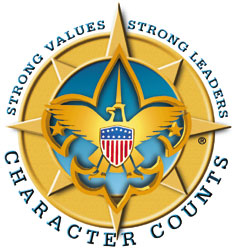![]() March-April 2001
March-April 2001

On June 28, 2000, the United States Supreme Court reaffirmed the Boy Scouts of America's standing as a private organization with the right to set its own membership and leadership standards.
To assist Scout leaders and others in the Scouting family in responding to and eliminating misconceptions resulting from inaccurate media coverage both during the court's deliberation and following its decision, the BSA External Communications Division has provided the following information.
·
FICTION: The U.S. Supreme Court recently ruled against the Boy Scouts of America and forced the organization to admit avowed homosexuals as members and leaders.
FACT: On June 28, 2000, the United States Supreme Court ruled in favor of the Boy Scouts of America in Boy Scouts of America vs. Dale (an avowed homosexual activist). In a 5-4 decision, the court upheld the Boy Scouts of America's standing as a private organization with the right to set its own standards for membership and leadership.
For more than 20 years, the Boy Scouts of America has defended its membership standards in various court cases. This U.S. Supreme Court decision allows the BSA to continue its mission of providing character-building experiences for young people, which has been its chartered purpose since its founding.
We believe an avowed homosexual is not a role model for the values espoused in the Scout Oath and Law.
·
FICTION: The Boy Scouts of America sued to have members and leaders who are avowed homosexuals kicked out of the organization.
FACT: The Boy Scouts of America is a private organization that has the right to set its own standards for membership and leadership. We have only defended ourselves in court when others have chosen to attack our standards.
The Boy Scouts of America makes no effort to discover the sexual orientation of any member or leader. Scouting's message is compromised when members or leaders present themselves as role models whose actions are inconsistent with the standards set in the Scout Oath and Law.
Rarely, if ever, has a boy expressed opposition to any of the values of the Scout Oath and Law. In the event that were to happen, we would encourage the boy to seek counsel from his parents or religious leaders, to make sure that his expression was the product of a mature decision.
Scouting's record of inclusion is impressive by any standard.
We respect other people's rights to hold opinions different from ours and ask that they respect our right to do likewise.
·
FICTION: Since the U.S. Supreme Court issued its decision, scores of Eagle Scouts have returned their Eagle Scout badges to the Boy Scouts of America national headquarters in Irving, Tex.
FACT: Since the inception of the BSA in 1910, 1,552,965 Eagle Scout badges have been earned. In 1999, the BSA awarded some 47,582 Eagle Scout badges to young men across the country.
Since the U.S. Supreme Court decision, less than 100 Eagle Scout badges have been returned to the BSA, representing about two one-thousandths of one percent of those badges awarded last year.
·
FICTION: The Boy Scouts of America has chosen to exclude avowed homosexuals from the ranks of its members and leaders because of a fear of pedophilia.
FACT: The BSA does not equate homosexuality with pedophilia, but neither avowed homosexuals nor pedophiles are appropriate role models for Scouting youth.
FICTION: The Boy Scouts of America is homophobic.
FACT: There is a difference between homophobia and spiritually based morals. The first is an irrational fear and implies a desire to eradicate anyone suspected of behavior associated with homosexuality. The second recognizes values embraced by the majority of Americans who adhere to religious principles.
·
FICTION: Each local BSA council has the ability to apply or not apply the membership standards set forth by the National Council.
FACT: The Boy Scouts of America is a private association that has the right to set its own standards for membership and leadership. There is only one set of standards for Scouting, which are set forth by the National Council.
·
FICTION: Recently, the Boy Scouts of America has lost corporate funding because of the organization's stance on membership.
FACT: The overwhelming majority of corporations continue to give strong support to Scouting at the local council level. Relatively few corporations have decided to end their support of Scouting. Unfortunately, some of these funds were designated for underprivileged and needy youth.
In fact, the recent court decision has energized fund-raising efforts at the local council level.
·
FICTION: In recent years, the United Way has chosen not to fund the Boy Scouts of America because of the organization's stance on membership.
FACT: The United Way, like the Boy Scouts of America, is made up of local chapters (in the BSA they are called councils). Of the more than 1,400 local United Ways nationwide, few have chosen to end their support of the BSA. The BSA looks forward to a continued strong relationship with local United Way chapters.
·
FICTION: In recent years, many local school districts have chosen to restrict access to their buildings and facilities because of the organization's stance on membership.
FACT: The Boy Scouts of America's local councils enjoy strong relationships with most local school districts.
Overall, the BSA enjoys the support of an overwhelming majority of school districts nationwide. In fact, a school district cannot legally exclude Scouting from access to the schools on the same basis as they afford it to other groups.
More information and resources that communicate the values of Scouting—including letters, articles, speeches, quick references, and a bimonthly "In Support of Values" newsletter—are available on the official BSA Web site.
Copyright © 2001 by the Boy Scouts of America. All rights thereunder reserved; anything appearing in Scouting magazine or on its Web site may not be reprinted either wholly or in part without written permission. Because of freedom given authors, opinions may not reflect official concurrence.
| The Boy Scouts of America | http://www.scouting.org |